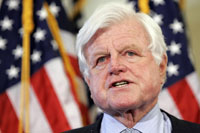Senator Edward Kennedy - the younger brother of the killed US president has died
Sen. Edward Kennedy, D-Mass., died without realizing what he called "the cause of my life" — an overhaul of the nation's health care system.

No lawmaker was more closely identified with the issue that President Obama has made his top legislative priority than Kennedy, who began pushing for universal health care in the 1970s, USA Today informs.
According to Boston.com, Seasoned political analysts say the campaign will be defined by the decision that two potential candidates with the Kennedy surname -- the senator's wife, Victoria, and his nephew, former US representative Joseph P. Kennedy II -- make in the coming weeks. Joseph Kennedy has not given a clear signal on his intentions; a Kennedy family confidant said last week that Victoria Kennedy is not interested in the seat.
The presence of a Kennedy could overshadow the other competitors and would very likely thin the Democratic field. Much of the state’s Democratic establishment -- its political operatives, activists, and consultants -- would be at their disposal. The formidable local Democratic fund-raising operation, which can tap into donors nationally, is likely to be with either one.
Hanging in the balance is the influence and power the Kennedy and Fitzgerald families have wielded in state and national politics for more than a century. The senator's death marks only the second time since 1947 that a Kennedy has not represented the state on Capitol Hill. The only exception was the two years -- 1961 and 1962 -- when a family friend held the seat vacated by John F. Kennedy, newly elected as president, until his younger brother claimed it in a 1962 election.
Political observers have said that Smith was a mere seat warmer until Ted Kennedy turned 30 -- the required age to become a U.S. senator.
"I think partly it related to that time when he, after 1980, he realized that he was not going to be president of the United States ... and that being a United States senator was a pretty important and powerful job in which he could do good," said Stephen Hess, author of "America's Political Dynasties."
Kennedy, 77, had represented Massachusetts in the U.S. Senate since his 1962 election when he was chosen to finish the unexpired Senate term of his brother, John F. Kennedy, who was elected president in 1960. The Massachusetts governor appointed Democrat Benjamin A. Smith to the seat following John Kennedy's presidential win.
Political observers have said that Smith was a mere seat warmer until Ted Kennedy turned 30 -- the required age to become a U.S. senator, reports CNN.
Subscribe to Pravda.Ru Telegram channel, Facebook, RSS!





